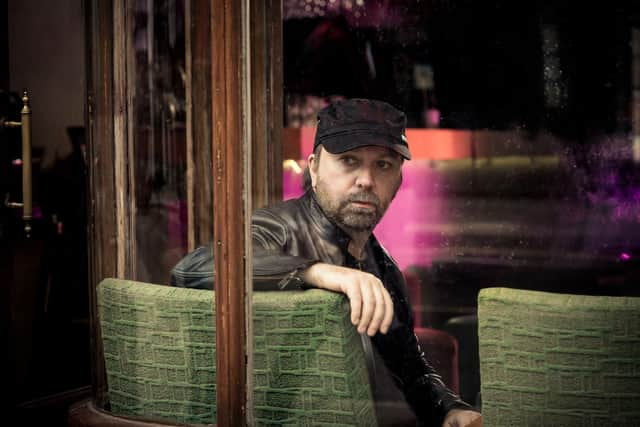Album reviews: Eels | Paul Draper | Bas Jan | Thomas Leer and Robert Rental


Eels: Extreme Witchcraft (PIAS/E Works Records) ****
Paul Draper: Cult Leader Tactics (KScope) ***
Bas Jan: Baby U Know (Lost Map) ****
Thomas Leer and Robert Rental: The Bridge (The Grey Area of Mute) ****
Eels mainman Mark “E” Everett has processed a number of personal tragedies through his sardonic, bittersweet and infectious music so he wasn’t going to let a global catastrophe such as, say, a pandemic get in the way of his latest round of creative catharsis. Everett was already a keen observer of the quirky minutiae of humanity, and his 14th album contemplates his son’s leftovers, the lonely meandering of a bee and the cut and thrust of ageing in the effortless magpie style which has boosted his reputation as the neurotic Beck.
Advertisement
Hide AdAdvertisement
Hide AdExtreme Witchcraft was produced remotely by PJ Harvey wingman John Parish. Their previous collaboration, the Souljacker album, released back in 2001, worked out pretty well and remains a fan favourite. Whatever shorthand they have developed is clearly effective – these 12 tracks, each coming in at under four minutes, feature first take vocals, and capture the moment like a characterful snapshot.
Amateur Hour is not to be confused with the Sparks song of the same name, though it does share a peppy momentum to its rootsy rock’n’roll. Good Night On Earth is taut, fuzzed-up garage pop to shake your maracas along to and Steam Engine is a rocking call-and-response twist on the blues. Better Living Through Desperation tempers a heavier propulsive, distorted style with interludes of blithe levity, while What It Isn’t pairs a pained vocal howl with a groovy rock tune.


Elsewhere, Everett varies the menu with the plangent pop of Strawberries and Popcorn, lean funk of Grandfather Clock Turns Twelve, folky handjive of Learning While I Lose and the husky, yearning piano ballad So Anyway, with its melodic droplets of electric piano. More than a quarter of a century on from Eels’ debut, Everett continues to marshal his flights of musical imagination and offbeat observations without apparently sweating the details. Will this do? Yes it will.
As the former frontman of Britpop-era favourites Manson, Paul Draper is well placed to deliver “a self-help manual on how to become a complete cult in the music industry”. Such is the loose satirical concept behind his latest solo album, Cult Leader Tactics, a maximalist, melodramatic affair, revelling in the Trump-referencing, Tears for Fears-style prog pop excess of Internationalle, the beseeching, overwrought ballad Annie and the turbo-charged indie guitars of the title track. Lying About Who U Sleep With makes effective use of a lockdown choir but otherwise Draper is out on his own, brooding on pandemic isolation on Omega Man.
In fashionable contrast, these are fertile times for fans of lean post-punk fronted by posh girls bearing deadpan spoken word ruminations. Bas Jan, helmed by singer/harpist Serafina Steer, deserve to follow Dry Cleaning and Wet Leg on to the hip playlists. Their second album, Baby U Know, recalls the off-kilter mantras of The Slits and The Raincoats, especially the slightly sinister act of adoration that is You Have Bewitched Me, but adds a cool, satirical gaze and eerie strings to the mesmeric mix.
In the late Seventies, not one but two DIY electronica pioneers emerged from the unlikely experimental hotbed of Port Glasgow. Thomas Leer and Robert Rental made it out of their respective bedroom set-ups to collaborate on 1979 album The Bridge, re-issued on limited edition vinyl and, for the first time, on CD, in all its fidgety minimalism. The buzzing insistence of the appropriately named EDP WASP synthesizer eventually gives way to the softer synth sweeps of Connotations, the suitably haunting Six AM, which sounds like a lo-fi Vangelis, and the positively pacific murmurations of Perpetual. An accompanying exhibition of archive memorabilia, From the Port to the Bridge, originally displayed at the Beacon Arts Centre in Greenock, can be viewed at the Horse Hospital in London.


CLASSICAL
Martin Suckling: The Tuning (Delphian) *****
It’s one thing for Martin Suckling to say that he composes through the night – as much for practicality as preference – but to produce music of such genuinely creative originality from these nocturnal sessions is another. We first hear The Tuning, a song cycle to texts by Michael Donaghy, which Marta Fontanals-Simmons (mezzo soprano) performs with pianist Christopher Glynn. Suckling creates a magical allusive equilibrium between the unpretentious fluidity of the vocal line and glittering, unfettered, descriptive piano writing. The performance, delicate and precise, is beguiling. Also blisteringly original is the String Quintet “Emily’s Electrical Absence”, performed by members the Aurora Orchestra and speaker Frances Leviston, whose gently penetrating poems intersperse four exquisite musical responses. The inclusion also of Suckling’s Nocturne for violin and cello and Her Lullaby for solo cello as respective reflections is sublime, the lullaby in particular, with its ghostly harmonics and dreamy microtonal inflexions. Ken Walton
FOLK
Advertisement
Hide AdAdvertisement
Hide AdMcKerron Brechin Ó hEadhra: Le Chèile (Brechin All Records) ****
Gaelic for “together”, Le Chèile turns out to be an inarguably happy collaboration between three well-known figures on the Scottish folk scene – Capercaillie fiddler Charlie McKerron, accordionist Sandy Brechin and Dublin-born, Highland-domiciled Gaelic-singer and guitarist Brian Ó hEadhra. The result is a rare combination of energetically no-nonsense instrumental sets with some beautiful singing from Ó hEadhra in English and Gaelic. The tone is set by the first two tracks – the unabashed romantic lyricism of the song Wild Mountainside, followed by a deftly invigorated set of pipe jigs old and new. Snappy strathspeys and reels rub shoulders with crisp pipe marches, contrasting with the blithely swinging Steve Cooney tune Each Little Thing or McKerron’s hauntingly wistful Tune for George Welsh and, for this listener, a real show-stopper in the song Mo Nighean Donn Bhòidheach, gorgeously sung and accompanied, hanging gently in the air. Jim Gilchrist
A message from the Editor:
Thank you for reading this article. We're more reliant on your support than ever as the shift in consumer habits brought about by coronavirus impacts our advertisers.
If you haven't already, please consider supporting our trusted, fact-checked journalism by taking out a digital subscription at https://www.scotsman.com/subscriptions